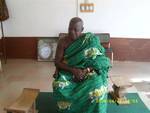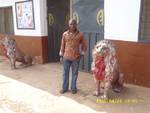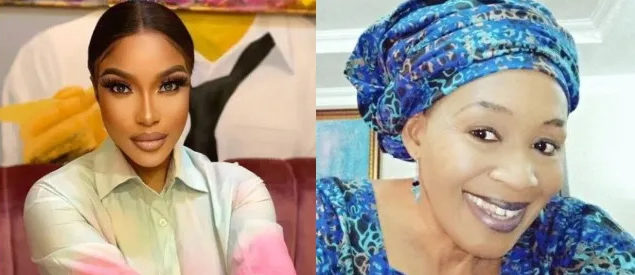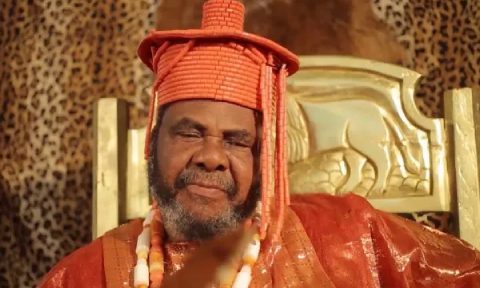
Nana Kokofu is a famous traditional ruler in the Ashanti region of Ghana. He is loved by not just people of his traditional area, but also in Africa and even in the western world. Emmanuel Gabari of https://www.nigeriafilms.com was on a recent trip to the Republic of Ghana. He visited places like Tema, Accra, Kumasi, Cape Coast and Kokofu all in Ghana. Amongst the several eminent dignitaries that he interviewed while in Ghana was the Nana of Kokofu, who also has a royal lineage with the King of Ashanti in Kumasi, Ghana. This interview was conducted at the palace of Nana Kokofu. Enjoy it.
Q. Please sir, can we know your full names?
I am Barima Offe Akwasi Okogyeasuo II, the Omanhene of Kokofu Traditional area. The paramount Chief of Kokofu traditional area. Kokofu is one of the 5 prominent Ashanti states which formed the confederation of Ashanti, which is also known as Ashantimahi. The throne is direct relationship to Atuomfo.
Q. How did it start for you?
I started as a professor teacher and ended up as education director, working in many schools and colleges like Westley College Kumasi, Anglican Training College Kumasi, Edunai Training College in Kwabresechre, Goldmine Schools Obuase, District Education Office Akunna Ashante
Q. What are some of the committee that you belong to?
Am a member of the Regional House of Chiefs, National House of Chiefs, Member National Research Committee for Chieftancy and a lot of other committees so numerous to mention.
Q. Are there programs you have embarked on for the youths in your community?
Presently, we are trying to find a way of putting our youths into employment after completing their education. We also are putting them into learning/acquiring skills through apprenticeship so they can be on their own. The first thing I did when I ascended the throne was to establish wood-carving centre, where the youth would learn the trade. I also made provision to train people in certain vocations. One of such vocational training was tie and dye and batik work. We had two difference courses for young boys and girls and we trained about 60 youths in that direction. After that, we set up another course to train people in mushroom planting, goat rearing, honey-making and grass-cutter rearing. Through this also, we were able to train another sets of youths. This will also be a continuous process, because we intend building the capacity of our youths to be better informed and also self-reliant.
Q. Were there also trainings on health issues?
Oh yes! We did a series of awareness campaign and seminar on HIV/AIDS. We selected and trained some very active young people and even adults to be peer group educators. They were trained to also sensitize others on the prevalence and ways of protecting themselves from HIV/AIDS, how to stop discrimination and take care of people infected with the disease. The training was for one month and they were sent to the community to do grassroot coverage and that helped to reduce the rate of infection. We are always into public enlightenment campaign to let our youths know the importance of abstinence as a key tool to preventing the spread of HIV/AIDS. We are constantly training and retraining peer educators so that they can be up to date with information they will need as they carry out their field work in the community.
Q. The Ashanti culture is a very rich and popular one both for Ghanaians, Africans and people of the world. How does it feel being a Chief in the Ashanti Region?
A. I feel great. It’s a service to humanity. It feels wonderful to carry your people along and show that you can lead well.
Q. The other day in your Palace, after a land dispute case between a widow and a man, the widow was poured white powder on her shoulder. What does that signify?
A. As a Chief, one of the important duties that you will have to perform is to arbitrate amongst your people and the cases are diverse in nature. Like land disputes, marital issues and also what we call curses. When there is a quarrel between two people and one person goes to seek spiritual force to curse the other person, you need to investigate deeply to find out if that curse was actually pronounced, and even if it was pronounced, what was the cause? Infact, pronouncing a curse on somebody here in the community is a crime on its own and it is punishable by slaughtering a sheep. But then, before that punishment is meted out on that person who cursed another, you have to go into the case in form of arbitration. Witnesses are called for the palace to find out details about the case. Sometimes, somebody might be punished for having cursed another person, yet, when you go through the case, you will find out that he was actually pushed to the wall before he pronounced the curse and so the punishment becomes a little lighter.
Back to your question, apart from curses, we have cases of land dispute. People might be fighting over a piece of land. And in this case the two people will have to stand before the Traditional Committee or Arbitration Committee and give the background history of the land; like how they got it, how long they have been working on it and so on. In so doing, both parties will be asked to call on people to testify/justify such claims, and when we find that one is more authentic and genuine than the other, he/she is declared the winner or victorious. And in that case, to signify his victory, white powder is poured on one of the shoulders. The one who is found guilty will have to render apologies to the elders and the person that he contested the land ownership with. He will also have to pay the expenses that the winner incurred while the land case was being conducted. Sometimes, for having disturbed the peace and wasted the time of the Traditional Committee in the palace, the loser will be fined an amount of money.
The chief always have to foster peace amongst people and arbitrate/intervene in issues so that the weak ones would not be cheated by the strong ones.
Q. You made mention of spirituality as part of the duties of a chief in the palace. What does it mean?
A. The chief makes sure the community is protected spiritually by offering regular prayers of protection on behalf of the people of the community, performing certain rites during festive days, so as to appease the gods and seek their support and blessings for the community.
Q. There was a new road construction that took place at the outskirt of Kokofu. It affected some graveyards close to the road, the corpses were exhumed, relocated and a three-day reburial ceremony conducted. Is reburial a very significant thing in the Kokofu culture and tradition?
A. We believe that when somebody dies and he is buried, he is put at peace to rest until the coming of the Lord Jesus Christ as the Bible says, and any disturbance to that sleeping body should be taken as a bad omen for the people. So when it became important for the government to reconstruct the roads passing through the public commentary, we were told that a number of graves will be affected. By our tradition, before you exhume any corpse from the grave, you have to perform certain rites and you have to accord the person a burial like he died the first time. So when we were told about the new road construction, we summoned the people in the community to tell them about government’s intention. The surveyors went to the place, marked the areas and showed us the graves that will be affected. The Chief Linguist (Priest) went round the graveyard, poured libation on the graves to inform the dead that some of their members’ peace will be disturbed a little. Then relatives were asked to get new coffins and exhume the bodies on their own and put them at a new location, in the same way they did when the person died. There was also a special three hours interdenominational burial service, where Christians, Muslims and other religious groups participated actively. The next day was the special funeral ceremony which started early in the morning with gunshots, the women in the community went round weeping and then the people converged in a place and the Chief and his elders welcomed everybody to the reburial ceremony. Speeches were read, drinks served round and the people were advised on the need to be modest when doing burials, because anything can happen and the money spent in doing costly tombs and caskets will become a waste. They were also told why they should situate graveyards far from the main roads.
Q. Over the years as a leader, what has life taught you in all your dealings with people and also in discharging your duties as a Chief?
A. As a Chief, I have realized that your former life before you ascend to the throne is very important. You will always have to draw experience, direction, guidance and all that from your previous working life to win the support of your people in performing your duties. You need people to go along with you wherever you move and if during your early active days as a young man or woman, you were not at peace with the people, the support you will need when you move up in life will not be there. The next thing is that you also need to draw on your previous experience about how you relate to people, so that this time you could be more diplomatic, specific and firm in the handling of issues around you. Another good thing is that as a Chief, I have come in contact with very many prominent people and I have learnt a lot from them. It has taught me that in life, one must not be complacent with any achievement but keep learning so as to be more successful. Being a Chief has given me the opportunity to move from place to place, on visits, tours, programs, etc. It has taken me to, not just within Ghana and Africa, but also to different parts of the world. I traveled to five states in the United States of America some time back for a program, and it was a wonderful experience for me. I have also travelled to Morocco, Liberia, Togo, Guinea, Nigeria. I visited Lagos twice and was amazed by the tremendous development.
Q. Some of our youths are losing touch with the African values that our forefathers taught and lived for in those days. What is your advise to parents, the youths and lastly the society?
A. What I will say is that a people without identity can hardly fit into any society. Every country’s culture/tradition is its identity. Firstly, I would like parents to take good care of their children, raise them up to respect and value their culture. Parents should be very careful how they behave, talk or relate to others people in front of their kids because that is where good and proper upbringing starts from. Secondly, to the youths, I would say they should be very wary of what they call modernity. Certain things come into a community which tends to destroy the rich culture of the people. One typical example is the indecent way our youths dress and behave nowadays. They walk around almost half naked. They also have to be very patient in life. There is dignity in labour. They should strive to get education, learn a trade/vocation or do something tangible that will improve their lives. They have to learn how to relate with people and show respect for their elders. They should also know that there is a creator who is God Almighty. They should serve God and mankind and also volunteer to work for humanity in their community.
Q. Inspite of your busy schedules and age, how come you are still able to look this fit, young and agile? What is the secret?
A. Without mincing words, there are two things that destroy people fast. It is excessive drinking and excessive sexual activities. Those who drink a lot tend to destroy the body and their behaviours and other things are affected. Those who also go into excessive sexual activities in an unbridled manner like dogs also destroy their body and exposes them to a lot of diseases. Therefore, that has been my secret. I won’t claim that as a human being I am a saint, but I do things moderately and do not over-indulge. Secondly, as a professional teacher, it has trained me to be physically, emotionally and psychologically alert at all times. I can’t remember any time I sat down teaching. I was always standing or always on the move. Even when I became an administrator I didn’t just sit down in my office, I was always moving around to see what was happening in my work place and the community to make sure that things are done well. Lastly, am always conscious of what I eat. I diet and exercise regularly. So maybe all these put together could be the reason for my staying fit.
Q. When Nana is not attending to issues at the palace, how do you relax and what is your favourite food?
A. I enjoy playing draught a lot. My favourite food is fufu and ampisi which I enjoy a lot. Sometimes I also eat rice, but it’s not been my favourite food at all.
Q. So what’s your last word to people who come across this interview?
A. I will divide it into four parts. One, to my people in the Kokofu Traditional Area of Ashanti, it is our duty now to maintain our traditional area. We don’t have to wait for the government to come and work for us. We have to initiate our own projects, so as to attract the government to help us.
Two, to my people in Ghana, fortunately and unfortunately, we have had a checkered history in administration. We started the colonial administration then went through the pre-independence and independence era. There was also the military administration that was a very wasted period in the history of Ghana because it brought untold hardship to our people. Now we have the opportunity to start again in a democratic dispensation, and we are working to build the country together. I would like to appeal to my Ghana people to be patient with our politicians. We have to criticize them, yes, we have to admonish them, yes, but not with malice or bitterness. It won’t be fair to undermine them, or spite them. Let’s leave them to run through their planned manifesto and programs. Afterall, we have every four years to kick them out or vote them in. Remember in unity we stand and divided we fall.
Three, to other African countries, whatever the whites have been able to do; with perseverance and patience we can do too, and therefore we must be very careful how we go about life. Some of our African leaders have been so disappointing and shameful in their actions that when you think about it as an African, you become ashamed. How can somebody stay in an office for 20 years and still wants to continue? I would want to use this opportunity to register my displeasure on some African leaders who have stayed for more than 10 years in office and still wants to continue. They should give way for others to come in so we can taste real leadership and see whether others can lead well. Variety makes better soup.
Lastly, to the world, we want to appeal to the advanced countries to be careful about how they throw their weight about. I mean the super powers. By throwing their weights about, they end up punishing the poor countries, the weak ones, those whose economies are not as powerful as the rest. I pray we all realize that we are living in a big village, and like every village, we have the weak and the strong, the poor and the rich, and when we live together peacefully and with better understanding, the world will be




















